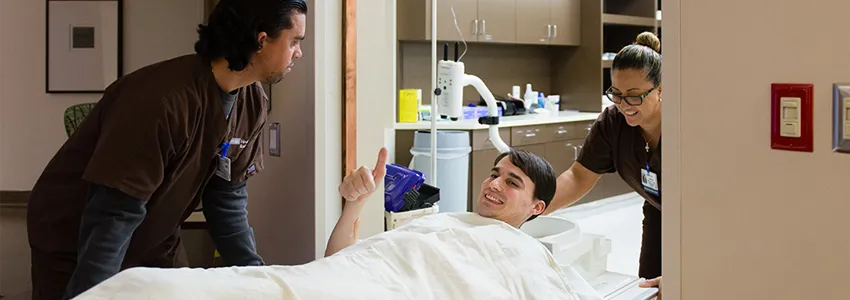
Photo by Heidi de Marco/KHN.
Stanford Medicine Scope - April 26th, 2017 - by Cameron Scott
For doctors, a rare disease can be a frustrating mystery. It poses challenges they haven’t learned about in medical school or encountered in practice, and similar cases are hard to find. For patients and their families, undiagnosed diseases are emotional roller coasters whose ups and downs come unpredictably.
“It’s like battling ‘an unknown enemy,'” said Euan Ashley, DPhil, MRCP, in a recent Kaiser Health News story. “That is a particular form of torment that other patients don’t have.”
Ashley, who directs the Stanford Center for Inherited Cardiovascular Disease and co-directs Stanford Health Care’s clinical genome service, is one of the principal investigators at the Stanford site of the Undiagnosed Diseases Network (UDN), a national network created to diagnose very rare diseases. Established in 2014 with funding from the National Institutes of Health, UDN is made up of six academic medical centers, including Stanford, working with the NIH to expand the list of rare diseases Western medicine can diagnose and treat.
The UDN network can “examine all known genes — not just the ones believed to have mutations that cause diseases, [which] can lead to the discovery of new illnesses,” the article states.
The piece illustrates the human cost of rare diseases by profiling Andrew Whittaker (shown above before receiving MRI), a California resident who is seeking a diagnosis at the UDN site at the University of California, Los Angeles. At age 19, Whittaker began having seizures, losing balance and muscle strength and having periods of confusion. Once an athlete, Whittaker now relies on his mother to feed and dress him.
The UDN doctors have found that Andrew has one copy of the gene variant that causes Parkinson’s. The disease only occurs when both copies of the gene have the same variant. But the finding, combined with Whittaker’s Parkinson’s-like symptoms, leads researchers to believe that he may have a previously unknown condition related to Parkinson’s.
The article concludes: “Andrew said his relatives have asked if he’s scared the doctors will find something. ‘I’m more scared if they don’t,’ he replied.”

